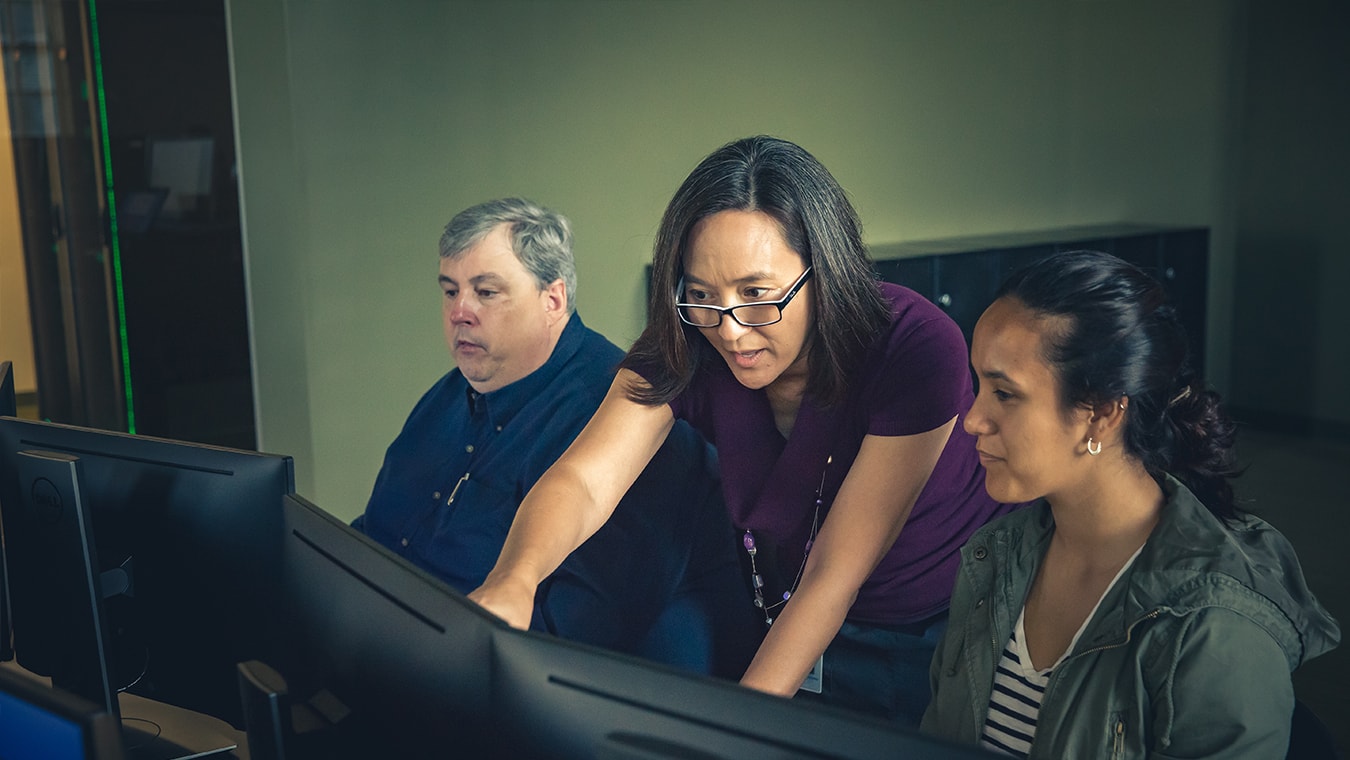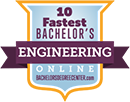
B.S. in Computer Engineering
Engineer Your Future
You love the challenge of problem-solving. Regent’s Bachelor of Science in Computer Engineering is a highly marketable degree that will prepare you to solve complex problems by applying principles of engineering, science and mathematics. Study the fundamentals in systems thinking, software engineering, computer programming and more—all taught from a Christian worldview.
DEVELOP YOUR SKILLS
Design IT solutions by understanding the relationship between computer hardware and software systems.
BUILD ON A STRONG FOUNDATION
Anchor your knowledge and skill on Christian principles and values.
LEARN FROM THE BEST
Be mentored by faculty in Virginia Beach who hold the highest degrees in their field.
ALIGN YOURSELF WITH EXCELLENCE
Regent has been ranked among Top National Universities by the U.S. News & World Report for two consecutive years (2019 and 2020). Our programs have been ranked by them as the #1 Best Online Bachelor’s Programs in Virginia for 8 years in a row. We have also been recognized as a Military Friendly Top 10 School by Military Friendly®, 2020, and among the Top 10 Best for Vets Colleges: Online & Nontraditional by Military Times, 2020. Experience the Regent difference through the Bachelor of Science in Computer Engineering degree program.
Upon completion of the B.S. in Computer Engineering you will be able to:
- Conduct experiments, analyze data and interpret results
- Assess the impact of engineering solutions
- Design and engineer all aspects of modern computing systems
Career Opportunities:
- Software Developer
- Computer Hardware Engineer
- IT Systems Administrator
- Robotic Engineer
- Engineer Researcher
- Product Designer
Terms and concepts in Computer Science. Topics include a review of algorithms, elementary data structures, program design, and programming utilizing a block structured programming language.
Fundamental concepts and techniques in computational design and relevant mathematics, including logic circuit design, modern processor architecture, and assembly language. Preparation for professional certification exam. Prerequisite: CSCI 201.
Design and implementation of modern Operating Systems, including Operating System components and structures, process and thread models, mutual exclusion and synchronization, scheduling algorithms, memory management, I/O controls, file systems, and security. Prerequisite: CSCI 201.
Programming with the C++ language; object-oriented programming; classes, objects, inheritance, morphism; pointers, memory management; software development. Prerequisite: CSCI 201.
Studies the design of structures for representing and deploying information. Considers abstract structures and implementation techniques in specific programming languages. Prerequisites: CSCI 314.
Study of tools and techniques of database analysis and design. Attention to data modeling, designing relational databases, and normalization using modern database applications. Preparation for professional certification exam, such as Oracle Database SQL Expert certification or similar. Prerequisites: CSCI 314.
Logic for electrical and computer systems, digital logic, logical systems including gates and functions, the theoretical basis for circuits. Prerequisite: CSCI 201.
Digital circuitry, applying digital logic, describe and model digital systems using VHDL, fundamentals of digital computer hardware. Prerequisite: ECEN 220.
History of engineering, standards & units, sensors & instruments, engineering drawing.
Engineering design and lifecycle, intelligent design, logistics & supply chains, engineering management. Introduction to traditional and contemporary branches of engineering. Prerequisite: ENGR 201.
Concepts, principles, and patterns of systems thinking. Systems dynamics, systems science. Systems approaches and graphical tools.
Models and their uses, types of models, modeling standards. Concepts of modeling and simulation. Trade space analysis, Optimization. Model-based engineering, software tools. Prerequisite: ENGR 202.
Application of engineering concepts and principles to address a real-life problem. Pre-requisite: Senior Standing and Department Approval.
Application of engineering concepts and principles to address a real-life problem. Prerequisite: ENGR 491.
A second course in calculus and analytic geometry. Techniques and applications of integration. Introduction to differential equations. Parametric equations and polar coordinates. Infinite series and power series. Prerequisite: MATH 211.
Discrete structures including sets, relations, functions, matrices, graphs and trees. Symbolic logic, mathematical induction, and introduction to proofs. Probability, combinations, permutations. Introduction to linear programming. Prerequisite: MATH 102, MATH 164, or MATH 211.
Systems of linear equations, linear transformations, and matrices, determinants, eigenvectors and eigenvalues. Euclidean spaces, vector spaces, and inner product spaces. Prerequisite: MATH 213.
Probability distributions, random variables, conditional probability. Data sampling, statistical measures. Methods for quantitative analysis.
Metrics and measurements, data analytics, tools and techniques. Prerequisite or co-requisite: MATH 250.
First and second order differential equations with applications. Linear systems of differential equations. Laplace transforms. Introduction to stability, nonlinear systems, and numerical methods. Prerequisite: MATH 230.
Structure and organization of the cosmos; discussion of the origin of and development of the early universe; exploration of current issues; assessment of present theories regarding the chemical origins of life and the transition of non-living structures to living organisms; explanation and application of the scientific method.
Calculus based solutions in electricity, magnetism, and optics. Three credit hour lecture with one credit hour lab. Prerequisite: Grade of C+ or better in PHYS 221.
2019-20 Tuition Rates
| Program Type | Tuition |
|---|---|
On-Campus Student
|
|
Online Student (enrolled in 8-week classes)
|
|
RN to B.S. in Nursing Tuition |
|
Student Fees
Fee | Amount | Description |
Application Fee (On-Campus & Evening/Online Students)
| $50 | One-time fee, nonrefundable |
Enrollment Deposit (On-Campus Students) Enrollment Deposit (Evening/Online Students) | $150
| Fee is deducted from tuition costs |
Graduation Fee(On-Campus & Evening/Online Students) | $60 | One-time fee upon submission of graduation application |
University Services Fee(On-Campus Students) | $700/semester | Contributes to university academic and administrative operations |
Optional Fees
Late Payment | $100/Session | Incurred per session in the event of late tuition payment |
Course Fees | Varies, | Some courses in theater, animation, cinema television or science labs carry an additional fee |
2020-21 Tuition Rates
| Program Type | Tuition |
|---|---|
On-Campus Student
|
|
Online Student (enrolled in 8-week classes)
|
|
RN to B.S. in Nursing Tuition |
|
Student Fees
Fee | Amount | Description |
Application Fee (On-Campus & Evening/Online Students)
| $50 | One-time fee, nonrefundable |
Enrollment Deposit (On-Campus Students) Enrollment Deposit (Evening/Online Students) | $150
| Fee is deducted from tuition costs |
Graduation Fee(On-Campus & Evening/Online Students) | $60 | One-time fee upon submission of graduation application |
University Services Fee(On-Campus Students) | $750/semester | Contributes to university academic and administrative operations |
Optional Fees
Late Payment | $100/Session | Incurred per session in the event of late tuition payment |
Course Fees | Varies, | Some courses in theater, animation, cinema television or science labs carry an additional fee |


